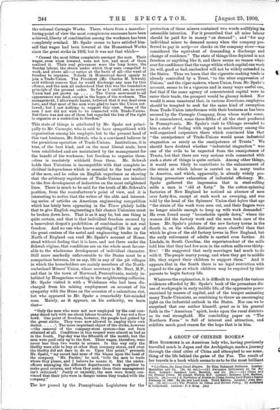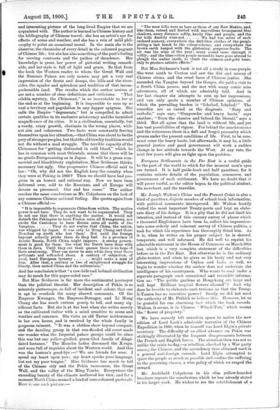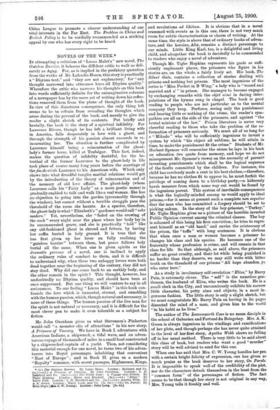A GROUP OF CHINESE BOOKS.*
Miss SCIDMORE is an American lady who, having previously travelled much in Japan and the Archipelago, made a journey through the chief cities of China and attempted to see some. thing of the life behind the gates of the Fus. The result of her travels is a book which seems to us to be the most brilliant • (1.) China, the Long-Lived Empire. By Eliza Rnhamah Scidmore. London : Macmillan and Co. [8a ed. net .]—(2.) European Settlements in the Far Bast. London : Sampson Low, Marston, and Co. [60.]—(3.) China and the Present Crisis. By Joseph Walton, M.P. London : Sampson Low, Marston, and Co. [es.]—(4.) A. Narrative of Events in China during Lord Elgin's Second Embassy in 1880. By the late Lord Loch. Third Edition. London : John Mur- ray. [8s. ed.]—(5.) The Problem in China and British Policy. By Archibald R. Colquhoun. London : P. S. MOM DILI
and interesting picture of the long-lived Empire that we are acquainted with. The author is learned in Chinese history and the bibliography of Chinese travel; she has an artist's eye for effect's of scene and weather, and she has a vein of mild phil- osophy to point an occasional moral. In the main she is the observer, the chronicler of every detail in the coloured pageant of Chinese life; but she has also something of the poet's feeling for moving contrasts and the pathos of decadence. Her knowledge is great, her power of pictorial writing remark- able, and her style is full of light and grace. So that from the book the Western reader, to whom the Great Wall and the Summer Palace are only names, may get a very real impression of the frosts and damps, the hills and the river- sides, the squalor and splendour and tradition of that incom- prehensible land. The results which the author arrives at are not a number of clear definitions and criticisms. " That oilskin mystery, the Chinaman," is as inscrutable to her at the end as at the beginning. It is impossible to sum up so vast a territory and population in any dapper epigram. She calls the Empire "degenerate," but is compelled to admit certain qualities in its exclusive aristocracy and the tarnished magnificence of its cities. It is a civilisation, essentially, but a weedy, crazy growth, obstinate in the wrong places, with- out aim and coherence. Two facts were constantly forcing themselves upon her attention,—that China was about to be the prey of stronger peoples, but thatthe old tawdry tradition would
not die without a mad struggle. The terrible capacity of the Chinaman for " getting distracted in cold blood," which he has in common with most Orientals, means that there will be no gentle Europeanising as in Japan. It will be a gross com- mercial and bloodthirsty exploitation, Miss Scidmore thinks, necessary but ugly.. One progressive Chinese official said to her : "Oh, why did not the English keep the country when they were at Peking in 1860 ? Then we should have had pro- gress in an honest and rational way. Now we have been delivered over, sold to the Russians, and all Europe will devour us piecemeal. Our end has come." The author reaches the same conclusions as Mr. Colquhoun on the lack of any common Chinese national feeling. She quotes again from a Chinese official:— " It is impossible to regenerate China from within. The motive power is not here. They do not want to be regenerated. They do not see that there is anything the matter. It would not disturb the Pekingese to have France seize all Kwangtsung, nor excite the Cantonese to have Russia seize all north of the Yangtsze They do not realise that China, the nation, was whipped by Japan. It was only Li Hung Chang and those Manchus up north who lost face.' Not until the foreign bayonet actually pricks them do they feel. As a province of Asiatic Russia, North China might improve. A strong govern- ment is good for them. See what the Dutch have done with them in Java. Until they cut their queues there is no hope of their awakening. They can never be men while they wear those petticoats and soft-soled shoes. A century of subjection, of
good, hard European tyranny might make a man of him. After that, a century or two of enlightened struggle for liberty, then united China and the millennium."
And her conclusion is that "a raw-bide and hobnail civilisation may do much for this paper-soled race."
But Miss Scidmore is far more the sentimental journeyer than the political theorist. Her description of Pekin is so minutely picturesque, so full of incident and colour, that one is apt to overlook the many shrewd comments. Of the Emperor Kwangsu, the Empress-Dowager, and Li Hung Chang she has much curious gossip to tell, and many sig- nificant facts. But she is at her best when she writes merely as the cultivated visitor with a mind sensitive to scene and weather and romance. She visits an old Tartar noblewoman in her own house, and is received by the whole family in gorgeous raiment. " It was a clothes show beyond compare, and the dazzling group in that sun-flooded old court made one wonder what the Imperial palace groups could be, since this was but one yellow-girdled, green-tiled family of dilapi- dated fortunes." The Manchu ladies discussed the X-rays, and were full of inquiries about the Western world. And this was the hostess's good-bye :—" We are friends for ever. I spend my heart upon you ; my heart speaks your language, but not my poor tongue." Miss Scidmore has much to tell of the Chinese city and the Pekin racecourse, the Great Wall, and the valley of the Ming Tombs. Everywhere the exceeding beauty of the climate mellowed her view, and for a moment North China seemed a land of rose-coloured pastorals. Here is one such picture :--
" The near hills were as bare as those of our New Mexico, and, like them, veined and fretted with marvellous transparent bine shadows, every distance softly, hazily lilac and purple, and the far hills duskily wine-red. . . . . . We had ten miles of such orchard scenery, everywhere the dull-blue clothes of the people giving a last touch to the colour-scheme, and everywhere the brown earth heaped with the glistening, gorgeous fruits. The air was the wine of the year ; every sound came through it softly; and the blue-cotton people seemed to have gone abroad to plough the amber earth, to climb the crimson and-gold trees, only to produce artistic effects."
But Miss Scidmore's book is not all a study in rose-purple. She went south to Canton and saw the dirt and misery of Chinese slums, and the cruel farce of Chinese justice. She ascended the Yangtse beyond the Gorges, she paid a visit to a South China yamen, and she met with many comic mis- adventures, all of which are admirably told. And in her last chapter she attempts to sum up her impressions, and can only quote a number of 'Chinese opinions, of
which the prevailing burden is "Ichabod, Ichabod!" The remedies are as varied as the diagnosis. " Soap and carbolic," says one ; " Gunpowder and heavy boots," says another; "Burn the classics and behead the literati," says a third. But all agree that the land is without life, and yet has vast possibilities of vigour. For behind the anachronisms and the rottenness there is a deft and frugal peasantry which groans under the present conditions of life. First, to be sure, must come the heavy boots, but afterwards, it may be, a little general justice and good government will work a sudden change in her attitude towards the West. At any rate, the next few years will give us light upon the problem.
European Settlements in the Far East is a useful guide to the part of the world to which for the moment men's eyes are turned. It is half guide-book and half gazetteer, for it contains minute details of the population, commerce, and government of each settlement. We have no doubt that it will prove useful, as the editor hopes, to the political student, the merchant, and the traveller.
Mr. Joseph Walton's China and the Present Crisis is also a kind of gazetteer, disjecta membra of school-book information, with political comments interspersed. Mr. Walton hastily visited the most important Treaty-ports and kept an elabo- rate diary of his doings. It is a pity that he did not limit his intention, and instead of this cursory survey of places which a thousand Englishmen have been to, collect his impressions into some orderly and coherent survey of Chinese politics, a task for which his experience has thoroughly fitted him. As it is, when he writes on his proper subject he is shrewd,
temperate, and well informed. He did well to reprint his admirable statement in the House of Commons on March 30th last, which is a very complete statement of the difficulties before us in the Far East. But otherwise he is the ordinary
globe-trotter, and when he gives us his hasty and not very
interesting impressions of Ceylon and India as well, we begin to wonder whether the author does not underrate the intelligence of his countrymen. Who wants to read under a separate paragraph such sensational and recondite informa- tion as : " The public gardens at Hong-kong are large and
well kept. Brilliant tropical flowers abound" ? And why does he trouble to elaborate such truisms as that the Tsung- li-Yamen has no executive power? Surely we did not need the authority of Mr. Pethick to believe this. However, let us be grateful for one charming fact which the book records. Walton, it seems, is in Chinese Wha-li-Tun," which means the " flower of propriety."
We have scarcely left ourselves space to notice the new edition of Lord Loch's admirable narrative of the Chinese Expedition in 1860, when he himself was Lord Elgin's private secretary. The difficulty of an allied advance on Pekin was strikingly illustrated by the frequent disagreements between the French and English forces. The situation then was not so unlike the crisis to-day,—a rebellion, checked by a War party among the Chinese, and the ascendency thus obtained used in a general anti-foreign crusade. Lord Elgin attempted to
spare the people as much as possible and confine the suffering to the governing classes, a wise policy of which we reaped the reward.
Mr. Archibald Colquhoun in his slim yellow-boarded brochure repeats the conclusions which he bas already stated in his larger work. He wishes to see the establishment of a China League to promote a clearer understanding of our vital interests in the Far East. The Problem in China and British Policy is to be cordially recommended as a striking appeal by one who has every right to be heard.




































 Previous page
Previous page